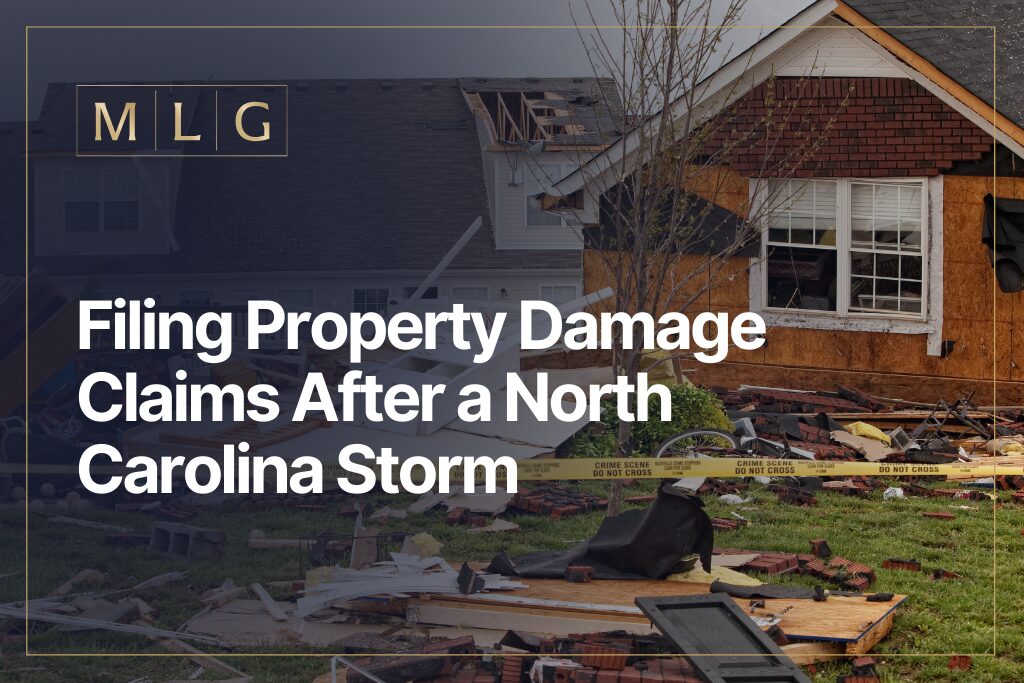Storms in North Carolina can leave homeowners and businesses facing significant repair costs and unexpected out-of-pocket expenses. Even moderate storms may lead to mold or structural damage if left unchecked. Understanding these risks helps policyholders make informed choices when assessing losses, evaluating insurance coverage for storms, and filing a storm damage claim in North Carolina.
Whether you’re dealing with wind-blown roof damage, flooding in a basement or other storm-related damages to property, a clear claim strategy is vital. Experienced North Carolina property damage claims attorneys guide you through each phase, from mitigation and documentation through negotiation or litigation.
After a Storm in North Carolina
After ensuring you and your family’s safety, taking prompt action can protect both your property and your claim:
- Mitigate Further Loss: North Carolina law requires policyholders to make reasonable efforts, such as tarping a damaged roof or boarding broken windows, to prevent additional damage while awaiting an adjuster.
- Document Every Expense: Photograph damage from multiple angles and record video walkthroughs. Keep an itemized list of damaged personal property, including model numbers and approximate value.
By securing the area, mitigating further loss and documenting all damage, you establish a strong foundation for your storm claim and protect your home or business from additional harm.
Understanding Your Insurance Coverage for Storm Damage
Most homeowners and commercial property insurance policies include coverage for losses caused by storms in North Carolina, but limits and exclusions can vary widely:
- Storm Deductible: Many policies impose a separate deductible, often a percentage of the insured value, specifically for hurricane or named-storm damage.
- Standard Deductible: A flat amount you pay before benefits apply.
- Covered Perils: Wind, hail and sometimes water intrusion are commonly covered; flood damage generally requires a separate National Flood Insurance Program policy.
Review your declarations page and the “perils insured against” section to confirm what losses are included. Knowing your storm deductible and coverage limits helps set realistic expectations for insurance payout for storm damage.
Filing a Storm Damage Claim in North Carolina
Once you’ve secured the premises and documented the loss, follow these steps in the storm damage claims process in North Carolina:
- Notify Your Insurer Promptly: Policy language often requires reporting “as soon as practicable” after property damaged after a storm in North Carolina.
- Submit a Proof of Loss for Storm Damage: A signed, sworn statement detailing the date of loss, description of each damaged item or structure, estimated cost of repair or replacement and any additional living expenses if the property is uninhabitable.
- Cooperate with the Adjuster: Provide invoices, repair estimates and receipts. Clarify any questions about special features – like custom cabinetry or historic architectural details – that may affect replacement cost.
- Keep Detailed Records: All communications, including claim numbers, the names of representatives spoken with and notes from each call or meeting.
Promptly notifying your insurer, submitting a detailed proof of loss and cooperating fully with adjusters ensures your losses are accurately assessed and supports a smooth claims process.
Handling Denied or Underpaid Storm Damage Claims
Even after you file, you may face a denied or an underpaid storm damage claim:
- Review the Denial: Letter. Insurers must provide reasons for denial or partial payment. Compare their explanation against your policy language.
- Request a Reinspection: If the insurer’s adjuster overlooked certain losses (such as hidden water damage), ask for another review, ideally with a contractor or independent adjuster present.
- File a Complaint: If you believe the company acted in bad faith under N.C. Gen. Stat. § 58-63-15, file a complaint with the North Carolina Department of Insurance.
- Demand Appraisal: Demand it if your policy includes an appraisal clause, letting you and the insurer each present an independent estimate that a neutral umpire compares.
- Consider Litigation: A court can order the insurer to pay both the full policy benefits and attorney’s fees if bad faith is shown.
Reviewing denials, requesting reinspection or appraisal and, if needed, filing a complaint or lawsuit compels insurers to honor your policy and pursue the compensation you deserve.
How a North Carolina Storm Damage Claims Attorney Can Help
Engaging a property damage claims attorney in North Carolina streamlines the process and enhances your chances of full recovery:
- Policy Analysis: Attorneys interpret your specific insurance coverage for storm events, clarifying what qualifies under your storm deductible and covered perils.
- Document Preparation: Lawyers ensure your proof of loss for storm damage is accurately completed and backed by all necessary evidence to maximize your insurance payout for storm damage.
- Negotiation with Insurers: Skilled advocates present demand packages – complete with repair estimates and expert reports – that reduce the likelihood of a denied or underpaid storm damage claim.
- Litigation Support: If negotiations stall, an attorney files suit, handles pre-trial motions and represents you in court, seeking policy benefits plus potential bad-faith damages and costs under North Carolina insurance laws.
An experienced storm damage claim attorney interprets your policy, prepares persuasive documentation, negotiates with insurers, and, when necessary, takes legal action to maximize your recovery.
Get the Right Amount for Your Storm Damage Claim in NC
Recovering after storm-related property damage in North Carolina requires timely action, thorough documentation, and a deep understanding of both policy terms and state regulations.
The Morgan Law Group has a proven track record representing homeowners and businesses through the storm damage claims process – from filing a storm damage claim to challenging denials and securing fair compensation.
For a detailed review of your loss and immediate guidance, call us today at (866) 305-1690 or complete our contact form to schedule your free consultation.

